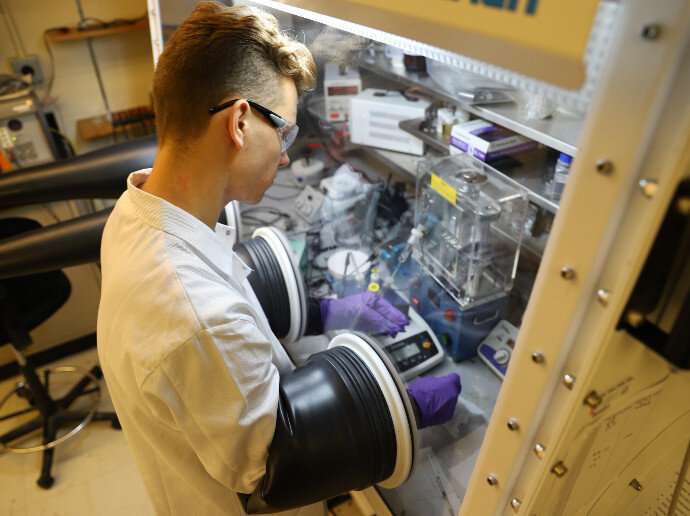Beyond lithium-ion: next generation battery research underway

New smartphones, portable devices and electric cars may get a lot of the public's attention but all of them are dependent on batteries to make them run. Most current devices use rechargeable lithium-ion batteries—technology that was first commercialized in the early 1990s. Lithium-ion batteries offered a longer life span, improved discharge and better efficiency over older rechargeable batteries but also come with some notable disadvantages. Lithium can be relatively expensive and difficult to recycle, and lithium-based batteries can have issues with overheating.
Lithium-ion batteries power our present but the future of power may be in development in Biomedical and Chemical Engineering Professor Ian Hosein's lab. Hosein and his material science research team are conducting research on materials that could be used in the next generation of batteries.
"When we work in material science, the materials we make have to meet a lot of different expectations," says Hosein. "We are thinking about what happens beyond lithium. Other materials can be inherently safer, less expensive and more environmentally benign."
Hosein and his team have been studying more abundant materials like calcium, aluminum and sodium to see how they can be used to engineer new batteries.
"If you want to push electric vehicles, you need to make sure it can deliver a lot of power and charge quickly," says Hosein. "That is a fundamental material science question. It requires careful research and development on different materials that can charge and store ions."
Battery research has a high bar for entry but Hosein says Syracuse University made the investment needed to develop, test and even prototype batteries. He believes development of next generation batteries is roughly where lithium was in the 1980s.
"There is risk taking. There will be materials that do not work. We have to be open to failures," says Hosein. "Sometimes it can be a shot in the dark but you have to try to know."
To commercialize new battery technology, the industry will need to see a cost benefit to the change. Hosein says it appears the supply of lithium may not be able to keep up with demand starting in five to seven years.
"We want to be there when the need is ready. We have world-class facilities that can compete with the best labs in the country," says Hosein. "The work we are doing is not just incremental, it is transformative and requires long-term investment to see it through."


















